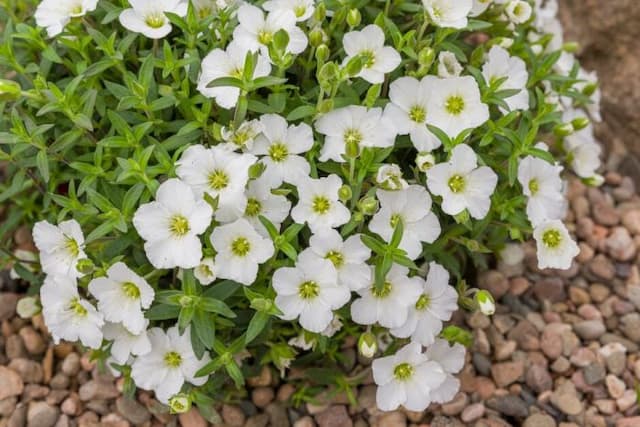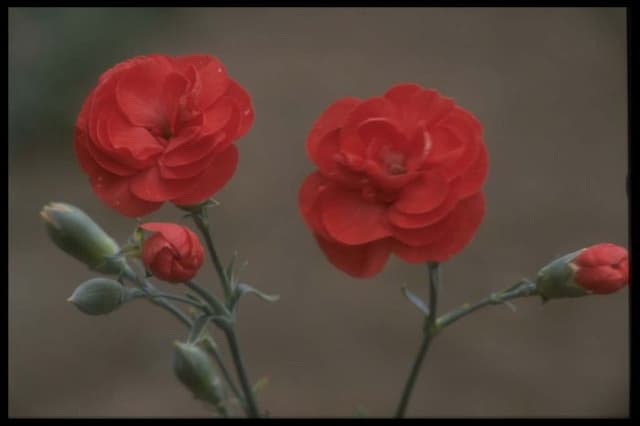Carnation Dianthus 'Irene's Choice' (p)

ABOUT
Dianthus 'Irene's Choice' is a captivating plant known for its beautiful, showy flowers and striking foliage. The blooms are a standout feature, displaying a vibrant mix of color at their tips which can range from deep pinks to almost purple, creating a gradient of hue that's both eye-catching and delicate. These petals are typically fringed, which adds to their visual appeal, giving them a soft, feathery look that's quite distinct. The blossoms often have a pleasant spicy scent. The petals may also have varying patterns that can include flecks or even what looks like intricate brush strokes. The foliage of Dianthus 'Irene's Choice' forms a neat cluster of slender, linear leaves. The leaves have a blue-green or gray-green color that contrasts beautifully with the bright flowers. They emanate from the base of the stems in a dense bunch, providing a lush backdrop for the brighter floral display above. The texture of the leaves is also a notable characteristic; they're typically somewhat grass-like – firm to the touch but not stiff, with a smooth margin. Overall, Dianthus 'Irene's Choice' makes for an attractive addition to any garden space, with its vivid, perfumed flowers and contrasting cool-toned foliage.
About this plant
 Names
NamesFamily
Caryophyllaceae
Synonyms
Sweet William, Pinks, Carnation
Common names
Dianthus 'Irene's Choice'.
 Toxicity
ToxicityTo humans
The plant commonly known as Carnation is generally considered to be non-toxic to humans. There are no well-documented toxic effects from ingesting any part of the plant in the Dianthus family, which includes 'Irene's Choice'. However, as with any plant, individual allergies or sensitivities could cause reactions in some people. If a person were to ingest a large amount of Carnation and experience unusual symptoms, it is recommended to seek medical advice.
To pets
Carnations, including the variety 'Irene's Choice', are considered to have low toxicity to pets such as dogs and cats. Ingestion might result in mild gastrointestinal upset, but the plant is not known to cause severe poisoning. Symptoms that could occur include mild vomiting or diarrhea if a pet eats a significant amount of the plant. If a pet shows adverse effects after consuming Carnation, it is advisable to contact a veterinarian.
 Characteristics
CharacteristicsLife cycle
Perennials
Foliage type
Evergreen
Color of leaves
Blue-green
Flower color
Pink
Height
1 feet 6 inches (46 cm)
Spread
1 feet (30 cm)
Plant type
Herb
Hardiness zones
5
Native area
Europe
Benefits
 General Benefits
General Benefits- Colorful blooms: Dianthus 'Irene's Choice' produces an array of brightly colored flowers, adding a vibrant splash of color to any garden.
- Long flowering period: This variety often has a longer blooming season compared to other plants, providing visual interest for an extended time.
- Attracts pollinators: The flowers of this plant attract bees, butterflies, and other beneficial pollinators, supporting local ecosystems.
- Drought tolerance: Once established, Dianthus 'Irene's Choice' can tolerate periods of low water, making it a good choice for water-wise gardens.
- Fragrance: The blooms emit a delightful fragrance that can enhance the sensory experience of a garden or outdoor space.
- Low maintenance: This plant generally requires minimal care, making it a convenient option for gardeners of all skill levels.
- Versatility: It can be used in various garden settings, including borders, rock gardens, and containers, offering design flexibility.
- Cold hardiness: Dianthus 'Irene's Choice' is able to withstand cooler temperatures, making it suitable for gardens in a wide range of climates.
- Deer resistance: The plant is often resistant to deer, which can help prevent damage and preserve your garden's aesthetic.
 Medical Properties
Medical PropertiesThis plant is not used for medical purposes.
 Air-purifying Qualities
Air-purifying QualitiesThis plant is not specifically known for air purifying qualities.
 Other Uses
Other Uses- Dried Flower Arrangements: The blooms of Dianthus 'Irene's Choice' can be dried and used to create long-lasting floral arrangements.
- Essential Oils: The fragrance of carnation can be extracted and used in the production of perfumes and essential oils.
- Edible Decorations: The petals of Dianthus 'Irene's Choice' are edible and can be used to decorate cakes and pastries.
- Natural Fabric Dyes: The flowers can be used to produce a range of dyes for coloring fabrics.
- Culinary Flavoring: Petals of the carnation can be used to infuse a light spicy flavor to syrups, wines, and some culinary dishes.
- Garden Borders: Carnations can be planted as borders around vegetable gardens to add color and aesthetic appeal.
- Companion Planting: They can be grown alongside other plants as companions to create beneficial plant communities.
- Teaching Tool: Carnations can be used in science experiments to demonstrate capillary action and how plants absorb water.
- Craft Supplies: The strong petals can be used in crafting, for making natural potpourri or decorative flower balls.
- Petal Confetti: Dried petals can serve as biodegradable confetti for celebrations and weddings.
Interesting Facts
 Feng Shui
Feng ShuiThe Carnation is not used in Feng Shui practice.
 Zodiac Sign Compitability
Zodiac Sign CompitabilityThe Carnation is not used in astrology practice.
 Plant Symbolism
Plant Symbolism- Love: The genus Dianthus is often associated with love and affection, possibly due to their heart-shaped petals and traditional use in bridal bouquets.
- Admiration: Carnations, the common name for Dianthus, typically symbolize admiration and the distinction of someone being very special, which could align with a cultivar named 'Irene's Choice'.
- Pure Affection: Carnations can also express pure love and affection, particularly through their long-lasting and pleasant fragrance.
- Promises of a New Beginning: 'Irene's Choice', with its name suggesting a selection or decision made, can be symbolic of the start of a new journey or commitment.
 Water
WaterSweet William should be watered deeply but infrequently, allowing the soil to dry out slightly between waterings. Typically, watering once or twice a week with about 1 inch of water should suffice, adjusting to less frequent watering during cooler or rainy periods and increasing to slightly more during extremely hot, dry spells. It's best to water at the base of the plants early in the morning to reduce evaporation and give the foliage time to dry out, as damp leaves can encourage disease. Overhead watering should be avoided to prevent foliar diseases. Always check the top inch of soil for dryness before watering again to avoid overwatering.
 Light
LightSweet William thrives in full sun, meaning at least six hours of direct sunlight per day. An ideal spot is one where the plant can bask in the morning sun but is protected from the harsh afternoon sun in hotter climates. If located in too much shade, the plant may not produce as many flowers and can become leggy.
 Temperature
TemperatureSweet William prefers moderate temperatures and can generally tolerate temperatures between 40 to 85 degrees Fahrenheit. It performs best where the daytime temperatures are around 60 to 70 degrees Fahrenheit and nighttime temperatures do not drop below 40 degrees Fahrenheit. They can survive a frost and are considered cold hardy in many regions.
 Pruning
PruningPruning Sweet William is important for promoting bushier growth, encouraging more blooms, and maintaining the plant's shape. Deadheading, or removing spent flowers, will stimulate new blooms. A more substantial pruning can be done after the first wave of flowering by cutting back about one-third to encourage a second bloom. Pruning is best done in the late spring after flowering has diminished.
 Cleaning
CleaningAs needed
 Soil
SoilFor Dianthus 'Irene's Choice', commonly known as pinks, the best soil mix is well-draining and loose, like a combination of loam, sand, and compost or peat moss. The ideal soil pH for pinks is slightly alkaline, ranging from 6.7 to 7.3.
 Repotting
RepottingPinks like Dianthus 'Irene's Choice' typically don't require frequent repotting and can be repotted every 2-3 years or when they outgrow their current container.
 Humidity & Misting
Humidity & MistingPinks, such as Dianthus 'Irene's Choice', thrive in moderate humidity levels but can tolerate dry air; avoid overly humid conditions to prevent disease.
 Suitable locations
Suitable locationsIndoor
Provide full sun, well-draining soil, and infrequent watering for pinks.
Outdoor
Plant in full sun, use well-drained soil, and space adequately for pinks.
Hardiness zone
4-9 USDA
 Life cycle
Life cycleThe life of a Sweet William, Dianthus 'Irene's Choice', begins with seed germination, occurring in late winter to spring under suitable temperature and moisture conditions. Seedlings emerge and establish a root system, followed by the development of a rosette of leaves. As the plant matures, usually within the first year, it sends up flowering stalks adorned with clusters of fragrant, brightly colored flowers, typically in late spring to early summer. After pollination, often facilitated by insects, the plant will produce seed capsules. Once seeds are dispersed, the plant may die back, especially if it is a biennial variety, or it may enter a period of dormancy during harsh weather conditions. For perennials, the cycle repeats with new growth in the following growing season, where the Sweet William will continue to produce blooms for several years.
 Propogation
PropogationPropogation time
Spring-Early Summer
The Dianthus 'Irene's Choice', commonly known as pinks, can be effectively propagated by taking cuttings. This method is commonly carried out in late spring to early summer when the plant is actively growing. You start by selecting healthy, non-flowering stems for cuttings, snipping them to a length of about 3 to 4 inches (approximately 7.5 to 10 cm). Strip the leaves from the lower half of the stem and dip the cut end into rooting hormone powder to encourage root growth. The prepared cutting can then be placed into a well-draining soil mix, ensuring that the leafless portion is buried while the remaining leaves remain above the soil surface. The pot should be placed in a warm area with indirect light and kept moist until the cuttings have rooted, which typically takes a few weeks. It's important to provide a stable environment with high humidity, which can be helped by covering the pot with a plastic bag or dome, to support the cuttings as they develop new roots.


![Pink [Tequila Sunrise]](/_next/image?url=https%3A%2F%2Fplants-admin.emdemapps.com%2Fimages%2Fplants%2F%2Fimages%2F604b5d995d06e.png&w=640&q=75)






